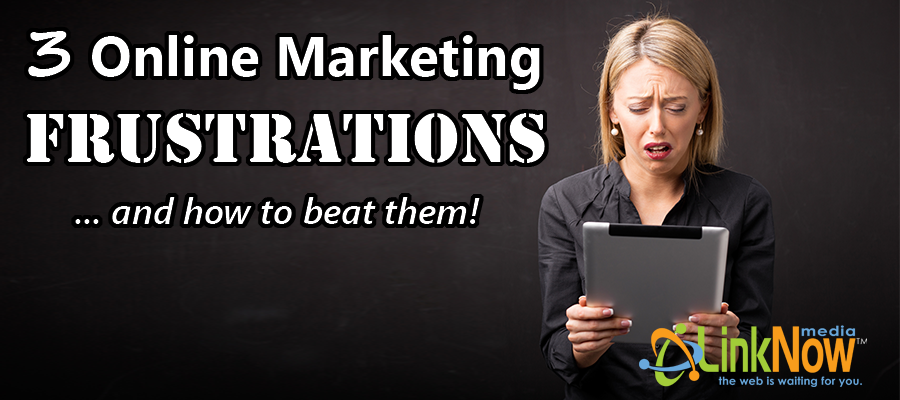
Online Marketing is harder than it sounds
Online marketing gurus tend to make it all sound so easy. “Just throw a site up on the web, write some content, and tweet at your customers and you’ll be making money hand over fist in no time.” Yeah, right.
Anyone who has tried their hand at online marketing knows that it can be a lot harder than that. It can seem like you’re doing everything right, but still not getting the results you want for your business. If you’re frustrated, you’re not alone.
Here are three of the issues that people new to online marketing struggle with the most, and the things you can do to deal with them.
Can’t get visitors to your website
What the experts say: “Beginning with your website, it’s vital to position yourself online with a strong, professional destination that gives customers the impression you mean business and the motivation to want to engage more with your business.” - Nicole Leinbach-Reyhle, Forbes.com
The reality: Your website isn’t going to impress any potential customers if nobody ever sees it.
This is probably the biggest complaint I hear from small business owners who are trying to market their companies online. They make or purchase a website, put it online, and then expect the visitors to just start rolling in.
Unfortunately, it doesn’t work that way. For people to land on your website, first they need to be able to discover it, and they need a reason to think that your site has what they’re looking for. There is a whole industry devoted to helping sites with these two things called Search Engine Optimization.
We’ve published several blog posts on SEO that you can read if you’re interested in more detail, but there are some basic things you can do to help your site rank in search engines and attract new visitors.
- Get your On-Page SEO right. SEO is the practice of making sure that Google and other search engines have a good understanding of what your website is all about, so they can deliver it to people who are searching for what you're offering. Make sure that the technical aspects of your site are properly configured for Google before you do anything else.
- Create great content. Content is the key to attracting visitors to your website. Regularly producing content that’s relevant to your business will show Google that you’re an expert and a great resource for people who are looking for information about your industry. Every piece that you publish gives Google that much more information, so create new content regularly.
- Build links to your site. Link building is another one of the key signals that show Google your site is high quality. Reach out to people who run other websites and ask them to share links to your content. Basically, the more links that are pointing at something, the more important Google thinks it is. If your content is good and relevant to another site’s audience, they’ll be happy to share your links.
The visitors to your site don’t buy anything
What the experts say: “It should be clear to business owners and marketers that the old models of retail have changed and that it's essential to change their strategy in accordance with the new reality. Ecommerce and online sales will become an ever-important factor in the revenue of retailers.” Peter Roesler, Inc.com
The reality: Even if you’re finally getting visitors to land on your website, that doesn’t necessarily mean they’re going to follow through and buy something from you.
Whether or not you’re trying to sell things directly from your website, the end goal of any online marketing effort is to turn site visitors into customers. If you’re getting lots of site visitors but nobody is buying from you, that’s showing you that people aren’t finding what they’re expecting to find on your site.
- Make sure you’re getting the right kind of visitors. If your site doesn’t match your visitors' intentions, they’re not going to stick around. This can happen when you’re targeting the wrong keywords with your content. If you’re a massage therapist and you decide your website should be targeting people who search for “back pain,” you might end up attracting a lot of visitors who are looking for the best pain medication, and they’re going to leave your site as soon as they realize it’s not what they’re looking for. Make sure your keywords are correct.
- Optimize your landing pages. Landing pages are the pages on your website that are designed to sell something as soon as potential customers arrive from a search engine. This is another place where expectations can cause problems. If someone thinks they’re clicking a link for one thing and end up on a page where they’re being sold something else, they’re not going to be happy. Trying to trick people into buying things online rarely works.
- Make sure you have a strong offer. When you’re trying to sell online, whether you want someone to buy a product directly from your website or you’re trying to get them to give you a call and book a service, you need to incentivize them to act immediately. You want them to feel like you have exactly what they’re looking for at a price they can’t argue with, so you need to create something more compelling than just a button that says “Click here to buy”. Whether this is a coupon, a special package deal, or something else is up to you.
Nobody follows you on Twitter or Facebook
What the experts say: “Every post you make on a social media platform is an opportunity for customers to convert. When you build a following, you’ll simultaneously have access to new customers, recent customers, and old customers, and you’ll be able to interact with all of them.” – Jayson DeMers, Forbes.com
The reality: When you’re starting out, it seems like it’s next to impossible to build a following.
You’ve gone through the trouble of setting up your social media accounts, customizing your profile pictures, and you’ve been consistently posting great content. But almost nobody is following you, and it seems like you’re shouting into a void.
As much as some blogs make it seem like social media is an “If you build it, they will come” scenario, it can be frustratingly slow to build up any kind of online property, and social media accounts are no exception. Whatever social media accounts you’re using for your business, you’ll need to put some effort into building them up. Facebook and Twitter are the most relevant for most businesses, so I’ll focus on those.
What works for each social network is slightly different. I’m going to focus on Facebook and Twitter because they’re the most relevant for most businesses, but the general principles could apply to Instagram, Pinterest, LinkedIn, or any other network.
- Share great content. At least a few times per day, you should share a link to a piece of great content that will be relevant to your audience. As often as possible, this should be something that you created, but you can also share links to other sites that people interested in your business might find useful. I recommend using a service like Buffer to schedule your posts so you don't need to spend all day sitting in front of your computer.
- Promote your posts. For a few dollars, most social networks will allow you to promote the content you post to users who aren’t already following you. Facebook in particular allows you to target very particular demographics, giving you the ability to promote your posts to exactly the people who would most appreciate them.
- On Twitter, interact with other accounts. Even more so than Facebook, Twitter is meant to be a social experience. Follow all the accounts you can find for other companies in your industry, and follow people who talk about the kinds of things you talk about. Retweet them, and comment on their tweets. Many of the people behind these accounts will reply to you, or retweet you in return. People follow accounts that they interact with, and you can gain a ton of new followers this way.
You’re not going to go from 0-10,000 followers in a week with these strategies, but if you keep them up consistently, you will collect new followers every day. People love to follow social accounts that are producing content they like – you just need to help them discover you.
Just don’t give up
Online marketing is undeniably effective, but it can definitely be an exercise in frustration for small business owners trying to manage it themselves. It can be extremely complex, which is why so many people choose to hire another company to manage their online marketing for them. But if you have the time and energy, if you stick with it, you’ll find that it can do wonders for your business.
Have you struggled with online marketing? What’s the biggest frustration your company has had? Leave a comment, or join the conversation with us on Twitter.





